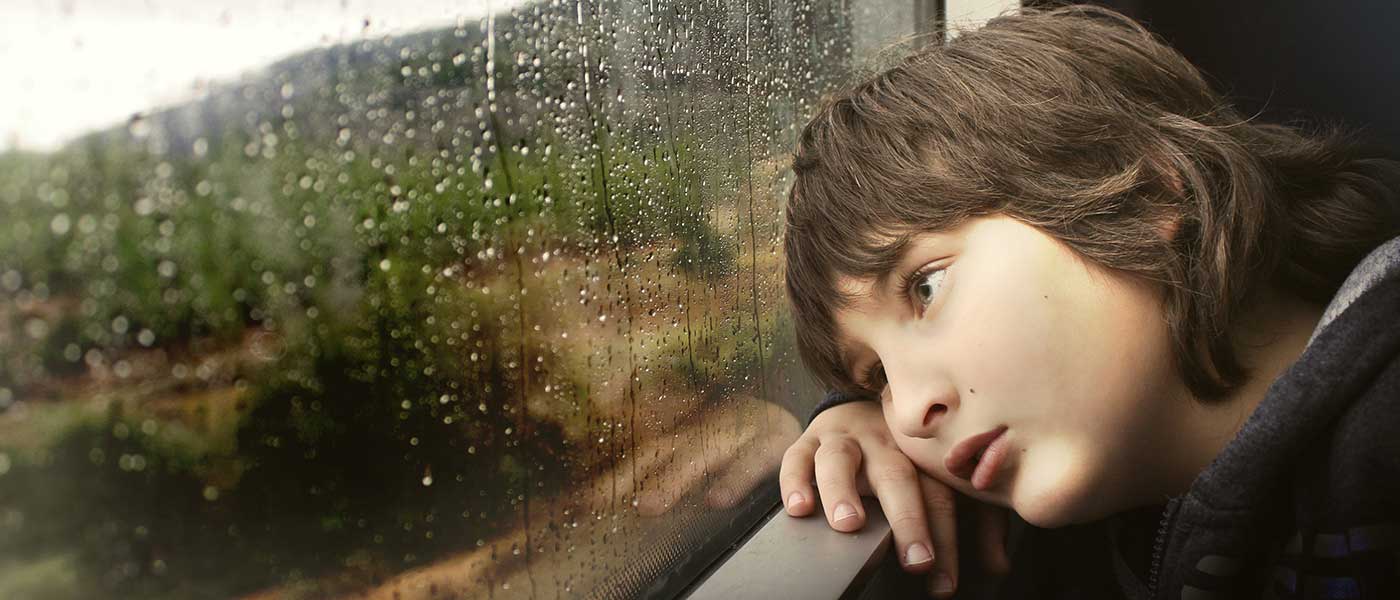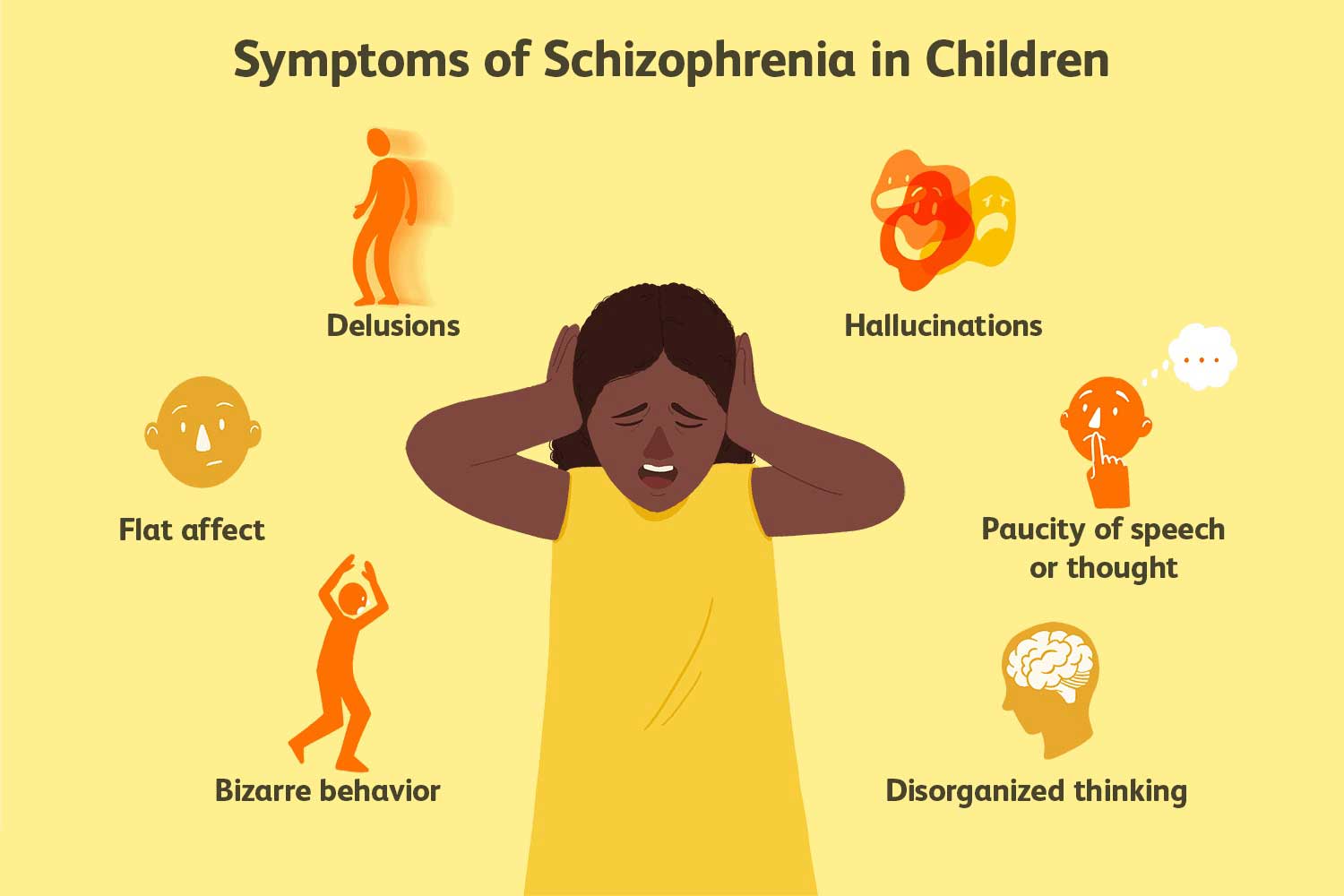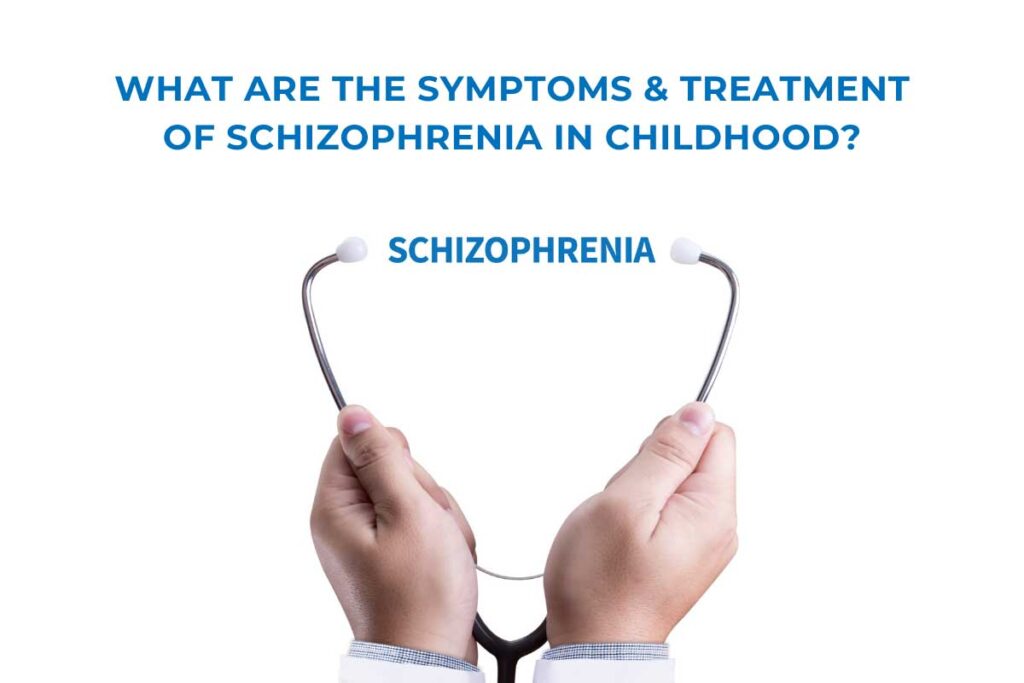WHAT IS CHILDHOOD SCHIZOPHRENIA?
Childhood schizophrenia is an unusual but severe mental disorder in which children and teenagers interpret reality abnormally. Schizophrenia includes a range of problems with thinking (cognitive), behavior, or emotions. It might result in some combination of hallucinations, delusions, and extremely disordered thinking and behavior that impairs your child’s ability to function.
Childhood schizophrenia is essentially the same as schizophrenia in adults, but it begins early in life — generally in the teenage years — and has a profound impact on a child’s behavior and development. With childhood schizophrenia, the early age of beginning presents special challenges for diagnosis, treatment, education, and emotional and social development.
Schizophrenia is a chronic condition that needs lifelong treatment. Identifying and starting treatment for childhood schizophrenia as early as possible might significantly improve your child’s long-term outcome.
SYMPTOMS
Schizophrenia includes a range of problems with thinking, behavior, or emotions. Signs and symptoms might vary, but usually involve delusions, hallucinations, or disorganized speech, and reflect an impaired ability to function. The effect could be disabling.
In most people with schizophrenia, symptoms generally start in the mid-to-late 20s, though it could start later, up to the mid-30s. Schizophrenia is considered early beginning when it starts before the age of 18. The beginning of schizophrenia in children younger than age 13 is extremely rare.
Symptoms could vary in type and severity over time, with periods of worsening and remission of symptoms. Some symptoms might always be present. Schizophrenia could be difficult to recognize in the early phases.
Early signs and symptoms
Schizophrenia signs and symptoms in children and teenagers are similar to those in adults, but the condition might be more difficult to recognize in this age group.
Early signs and symptoms might include problems with thinking, behavior, and emotions.
Thinking:
- Problems with thinking and reasoning
- Bizarre ideas or speech
- Confusing dreams or television for reality
Behavior:
- Withdrawal from friends and family
- Trouble sleeping
- Lack of motivation — for instance, showing up as a drop in performance at school
- Not meeting daily expectations, like bathing or dressing
- Bizarre behavior
- Violent or aggressive behavior or agitation
- Recreational drug or nicotine use
Emotions:
- Irritability or depressed mood
- Lack of emotion, or emotions inapt for the situation
- Strange anxieties and fears
- Excessive suspicion of others
LATER SIGNS AND SYMPTOMS
As children with schizophrenia age, more typical signs and symptoms of the disorder start to appear. Signs and symptoms might include:
- Delusions – These are wrong beliefs that are not based on reality. For example, you think that you are being harmed or harassed; that certain gestures or comments are directed at you; that you have exceptional ability or fame; that another person is in love with you; or that a major catastrophe is about to happen. Delusions happen in most people with schizophrenia.
- Hallucinations – These generally involve seeing or hearing things that do not exist. Yet for the person suffering from schizophrenia, hallucinations have the full force and impact of a normal experience. Hallucinations could be in any of the senses, but hearing voices is the most common hallucination.
- Disorganized thinking – Disorganized thinking is derived from disorganized speech. Effective communication could be impaired, and answers to questions may be partially or completely unrelated. Rarely, speech might include putting together meaningless words that cannot be understood, sometimes known as word salad.
- Extremely disorganized or abnormal motor behavior – This might show in many ways, from childlike silliness to unpredictable agitation. Behavior is not focused on a goal, which makes it difficult to do tasks. Behavior could include resistance to instructions, inappropriate or bizarre posture, a complete lack of response, or useless and excessive movement.
- Negative symptoms – This refers to reduced or lack of ability to function properly. For example, the person may neglect personal hygiene or appear to lack emotion — does not make eye contact, does not change facial expressions, speaks in a monotone, or does not add a hand or head movements that normally occur when speaking. Also, the person might avoid people and activities or lack the ability to experience a pleasure.
Compared with schizophrenia symptoms in adults, children and teens might be:
- Less likely to have delusions
- More likely to have visual hallucinations
SYMPTOMS MAY BE DIFFICULT TO INTERPRET
When childhood schizophrenia begins early in life, symptoms may build up slowly. Early signs and symptoms may be so vague that you cannot recognize what is wrong. Some early signs could be mistaken for typical development during early teen years, or they could be symptoms of other mental or physical conditions.
As time goes on, signs might become more severe and more noticeable. Eventually, your child might develop the symptoms of psychosis, including hallucinations, delusions, and difficulty organizing thoughts. As thoughts become more disorganized, there’s often a “break from reality” (psychosis) frequently needing hospitalization and treatment with medication.
WHEN SHOULD YOU SEE A DOCTOR?
It could be difficult to know how to handle vague behavioral changes in your child. You might be afraid of rushing to conclusions that label your child with a mental illness. Your child’s teacher or other school staff might alert you to changes in your child’s behavior.
Look for medical care as soon as possible if you have concerns about your child’s behavior or development.
Suicidal thoughts and behavior
Suicidal thoughts and behavior are common among people suffering from schizophrenia. If you have a child or teenager who is in danger of attempting suicide or has made a suicide attempt, make sure someone stays with him or her. Call 911 or your local emergency number promptly. Or if you think you could do so safely, take your child to the nearest hospital emergency room.
CAUSES :-
It is not known what causes childhood schizophrenia, but it is thought that it develops in the same way as adult schizophrenia does. Researchers believe that a combination of genetics, brain chemistry, and the environment contribute to the development of the disorder. It is not clear why schizophrenia starts so early in life for some and not for others.
Problems with certain naturally occurring brain chemicals, including neurotransmitters known as dopamine and glutamate, may contribute to schizophrenia. Neuroimaging studies show differences in the brain structure and central nervous system of people suffering from schizophrenia. While researchers are not certain about the significance of these changes, they indicate that schizophrenia is a brain disease.
RISK FACTORS :-
Although the precise cause of schizophrenia is not known, certain factors seem to increase the risk of developing or triggering schizophrenia, including:
- Having a family history of schizophrenia
- Increased immune system activation, like from inflammation
- Older age of the father
- Some pregnancy and birth complications, like malnutrition or exposure to toxins or viruses, may impact brain development
- Taking mind-altering (psychoactive) drugs during teen years
COMPLICATIONS:-
Left untreated, childhood schizophrenia could result in severe emotional, behavioral, and health problems. Complications related to schizophrenia may occur in childhood or later, such as:
- Suicide, suicide attempts, and thoughts of suicide
- Self-injury
- Anxiety disorders, panic disorders, as well as obsessive-compulsive disorder (OCD)
- Depression
- Abuse of alcohol or other drugs, involving nicotine
- Family conflicts
- Unable to live independently, attend school, or work
- Social isolation
- Health and medical problems
- Being victimized
- Legal and financial problems, and homelessness
- Aggressive behavior, although uncommon
PREVENTION :-
Early identification and treatment might help get symptoms of childhood schizophrenia under control before severe complications develop. Early treatment is also crucial in helping limit psychotic episodes, which could be extremely frightening to a child and his or her parents. Ongoing treatment could help improve your child’s long-term outlook.
DIAGNOSIS :-
Diagnosis of childhood schizophrenia involves ruling out other mental health disorders and determining that symptoms are not due to alcohol or drug use, medication, or a medical condition. The process of diagnosis might involve:
- Physical exam – This might be done to help rule out other problems that could be causing symptoms and to check for any related complications.
- Tests and screenings – These might include tests that help rule out conditions with similar symptoms and screening for alcohol and drugs. The doctor might also request imaging studies, like an MRI or CT scan.
- Psychiatric evaluation – This includes observing appearance and demeanor, asking about thoughts, feelings, and behavior patterns, including any thoughts of self-harm or harming others, assessing ability to think and function at an age-appropriate level, and assessing mood, anxiety, and potential psychotic symptoms. This also involves a discussion of family and personal history.
- Diagnostic criteria for schizophrenia – Your doctor or mental health professional might use the criteria in the Diagnostic and Statistical Manual of Mental Disorders (DSM-5), published by the American Psychiatric Association.
CHALLENGING PROCESS:-
The path to diagnosing childhood schizophrenia could sometimes be long and challenging. In part, this is because other conditions, like depression or bipolar disorder, can have similar symptoms.
A child psychiatrist might want to monitor your child’s behaviors, perceptions, and thinking patterns for several months or more. As thinking and behavior patterns and signs and symptoms become clearer over time, a diagnosis of schizophrenia might be made.
In some cases, a psychiatrist might recommend starting medications before making an official diagnosis. This is particularly important for symptoms of aggression or self-injury. Some medications might help limit these types of behavior.
TREATMENT :-
Schizophrenia in children needs lifelong treatment, even during periods when symptoms seem to go away. Treatment is a specific challenge for children with schizophrenia.
Treatment team
Childhood schizophrenia treatment is generally guided by a child psychiatrist experienced in treating schizophrenia. The team approach might be available in clinics with expertise in schizophrenia treatment. The team might include, for example, your:
- Psychiatrist, psychologist, or another therapist
- Psychiatric nurse
- Social worker
- Family members
- Pharmacist
- Case manager to coordinate care
Main treatment options
The main treatments for childhood schizophrenia include:
- Medications
- Psychotherapy
- Life skills training
- Hospitalization
MEDICATIONS :-
Most of the antipsychotics used in children are the same as those used for adults suffering from schizophrenia. Antipsychotic drugs are often effective at managing symptoms like delusions and hallucinations.
In general, the aim of treatment with antipsychotics is to effectively manage symptoms at the lowest possible dose. Over time, your child’s doctor might try combinations, different medications, or different doses. Depending on the symptoms, other medications also might help, such as antidepressants or anti-anxiety drugs. It could take several weeks after starting a medication to notice an improvement in symptoms.
Second-generation antipsychotics
Newer, second-generation medications are usually preferred because they have fewer side effects than first-generation antipsychotics do. However, they might cause weight gain, high blood sugar, high cholesterol, or heart disease.
Examples of second-generation antipsychotics approved by the U.S. Food and Drug Administration (FDA) to treat schizophrenia in teenagers age thirteen and older include:
- Aripiprazole (Abilify)
- Lurasidone (Latuda)
- Olanzapine (Zyprexa)
- Quetiapine (Seroquel)
- Risperidone (Risperdal)
Paliperidone (Invega) is FDA-approved for children twelve years of age and older.
First-generation antipsychotics
First-generation medications are generally as effective as second-generation antipsychotics in controlling delusions and hallucinations. In addition to having some side effects similar to those of second-generation antipsychotics, first-generation antipsychotics also might have frequent and potentially significant neurological side effects. These include the possibility of developing a movement disorder known as tardive dyskinesia, which may or may not be reversible.
Because of the increased risk of severe side effects with first-generation antipsychotics, they often are not recommended for use in children until other options have been tried without success.
Examples of first-generation antipsychotics approved by the FDA to treat schizophrenia in children and teens are:
- Perphenazine for children twelve years and older
- Thiothixene for children twelve years and older
MEDICATION SIDE EFFECTS AND RISKS
All antipsychotic medications have side effects and potential health risks, some life-threatening. Side effects in children and teenagers may not be the same as those in adults, and sometimes they may be more severe. Children, particularly very young children, may not have the capacity to understand or communicate about medication problems.
Talk to your child’s doctor about potential side effects and how to manage them. Be alert for problems in your child, and report side effects to your doctor as soon as possible. The doctor might be able to adjust the dose or change medications and limit side effects.
Also, antipsychotic medications could have dangerous interactions with other substances. Inform your child’s doctor about all medications and over-the-counter products your child takes, including vitamins, minerals, and herbal supplements.
Psychotherapy
In addition to medication, psychotherapy, sometimes known as talk therapy, can help manage symptoms and help you and your child cope with the disorder. Psychotherapy might include:
- Individual therapy – Psychotherapy, such as cognitive behavioral therapy, with a skilled mental health professional could help reduce symptoms and help your child learn ways to deal with the stress and daily life challenges of schizophrenia. Learning about schizophrenia could help your child understand the condition, cope with symptoms and stick to a treatment plan.
- Family therapy – Your child and your family might benefit from therapy that provides support and education to families. Involved, caring family members could be extremely helpful to children with schizophrenia. Family therapy can also help your family improve communication, work out conflicts and cope with the stress associated with your child’s condition.
Life skills training
Treatment plans that include building life skills could help your child function at age-appropriate levels when possible. Skills training might include:
- Social and academic skills training – Training in social and academic skills is a crucial part of treatment for childhood schizophrenia. Children with schizophrenia usually have troubled relationships and school issues. They might have difficulty carrying out typical daily tasks, such as bathing or dressing.
- Vocational rehabilitation and supported employment – This focuses on helping people suffering from schizophrenia prepare for, find, and keep jobs.
Hospitalization
During crisis periods or times of severe symptoms, hospitalization might be necessary. This could help ensure your child’s safety and make sure that he or she is getting proper nutrition, sleep, and hygiene. At times the hospital setting is the safest and best way to get symptoms under control rapidly.
Partial hospitalization and residential care might be options, but severe symptoms are usually stabilized in the hospital before moving to these levels of care.
If you or anyone you know is suffering from childhood schizophrenia, our expert providers at Specialty Care Clinic
Call 469-545-9983 to book a telehealth appointment for an at-home check-up.




